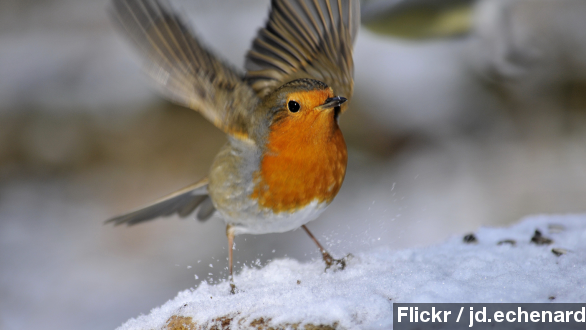A German team found humans' electric equipment and AM radio signals have been confusing European robins' internal compasses, making it harder for our feathered friends to navigate.
"Scientists believe the effects are strongest when the birds fly over urban areas and the report says the birds are sometimes forced to switch to backup navigational systems using the sun and the stars instead." (Via BBC)
Time reports "man-made radiation stemming from electronic devices" is to blame - but did say a researcher and co-author of the report from Germany's University of Oldenburg didn't believe it at first. (Via Flickr / jd.echenard, Flickr / phenolog)
"'At first, I was highly sceptical that this could be the explanation. ... But if you have seemingly unlikely effects then the proof needs to be much stronger - and that is why we have done so many experiments over seven years.'" (Via Time)
Outside Online explains the research shows our devices "pollute the atmosphere" with electromagnetic waves. Here's the difference...
"[The researcher] covered wooden huts housing his robins with aluminum plating ... When his team grounded the plating—reducing the electromagnetic interference ... they found that the birds could orient themselves."
Now, inside those huts was thermal paper - and when the birds attempted to fly north, their feet would mark the paper in the direction they attempted to fly. And if you haven't already guessed it - the birds couldn't figure out where north was when the huts weren't grounded.
So, why do we care? Nature explains...
"The work raises the controversial prospect that it might be necessary for humans to stop using the relevant part of the electromagnetic spectrum." That could include things like AM radio transmissions.
Still, other scientists have cautioned against concluding the findings applied to birds in all cities. The researchers are planning more experiments to understand how birds use their magnetic senses to navigate.


